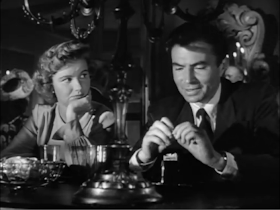The River (Jean Renoir, 1951)
Claude Renoir's literally painted-on Technicolor cinematography is a movie miracle, bringing out all the nostalgic fondness of Rumer Godden's florid remembrances and aiding his uncle's direction immeasurably. But Uncle Jean's gift for capturing the spirit of his characters almost works against him here, propping up the uncomfortable imperial paternalism of Godden's white characters. First love is a universal tale, but then so, unfortunately, are white industrialists relying on ethnic labor. As uncomfortable as the whole thing made me, there is still a refreshing lack of melodrama to the love quadrangle, and Renoir's addition of a mixed-race girl and her attendant alien suggests a deeper appreciation for racial politics than Godden displays. But still. "It's one of the least mysterious countries there are," Renoir says in the accompanying introduction. "For a frenchman, India is very easy to understand. People there have just about the same reactions as we do." How would he know? Grade: B
Caught (Max Ophüls, 1949)
Ophüls' camerawork is as thrilling as it is ostentatious. The grandest, most unnecessary gesture? A swirling 180-degree pan takes the place of a shot/reverse setup. But there's always a strange logic to his florid direction, and he infuses this warped tale of love and money with both flushed-face melodrama and noirish terror. Barbara Bel Geddes gives a believable desperation to the woman who convinces herself she married for love to avoid the darker truth of her desires. James Mason plays the pediatrician who gives her hope for a better life by virtue of being James Mason. But it's Robert Ryan as a psychopathic millionaire, complete with a gay Igor figure as his effete servant, who steals the show. His madness, and Ophüls' long-shot, deep focus framing, turns his absurdly oversized home—Versailles built to scale, apparently—into an ornate prison. Bonus points for suggesting that pregnancy, too, can be a cage. Grade: B+
Bottle Rocket (Wes Anderson, 1996)
A bit rough 'n tumble compared to Anderson's future work, but also a smorgasbord of future themes and stylistic flourishes. Working with existing locations more than his own sets, Anderson nevertheless manages to fill the screen with his favored pastels and primary colors, from yellow-lit rooms to water an impossibly bright shade of blue for a cheap motel pool. The characters here are the picture of innocence the director would spend the rest of his career both affectionately propping up and gently but firmly critiquing. As with all the other obsessive list-makers in Anderson's universe, Owen Wilson's Dignan is catastrophically unorganized and directionless, but there's something so hopeful about him one wishes he fulfills his dream, even if his dream is to be a robber. The humor here is less deadpan and more silly than subsequent Anderson films, but it still displays that love and insight that so many underrate. Grade: B+
Best scene: Though the climactic heist is a mini-masterpiece of absurdist comedy, my favorite moment is the back-and-forth between budding lovers Anthony and Inès that requires a third party to translate. The poor sap translates in real time, dully processing English into Spanish and vice-versa as emotions of love and frustration roil around him. Faster paced than nearly anything Anderson's done since, it is one of his best comic showcases.
Murder by Contract (Irving Lerner, 1958)
A comic Le Samouraï, Lerner's shoestring-budgeted noir does hip crime movie better than some of the New Wave movies that drew upon cheap but muscular fare like this for inspiration. Lean is the name of the game here, with simple camera setups and mise-en-scène and dialogue to match. Odets this ain't. But the detached professionalism of the contract killer Claude does lend itself to no small amount of irony, further linking this to the post-Touch of Evil crime film. The killer's refusal to use a gun makes his approaches unorthodox and eventually absurd, with elaborate plans for electrocuting someone and even killing her with a flaming arrow. At 81 minutes, the film doesn't waste a second, even when Claude certainly does, spending a few idle minutes hitting golf balls at a driving range as his assistants look on furiously. Perry Botkin's guitar score underpins the mood, the sharp picking generating a tense atmosphere even as the occasionally light tone of it makes light of the whole situation. Martin Scorsese cited the film as a major influence, and its spontaneity and simultaneous fascination and utter disgust with violence certainly point toward early aesthetic inspiration and lasting thematic focus for America's greatest living director. Grade: A




I love Murder By Contract, rarely see it discussed. Nice blog
ReplyDeleteIt's really fantastic. One of the better stripped-down noirs I've seen.
Delete